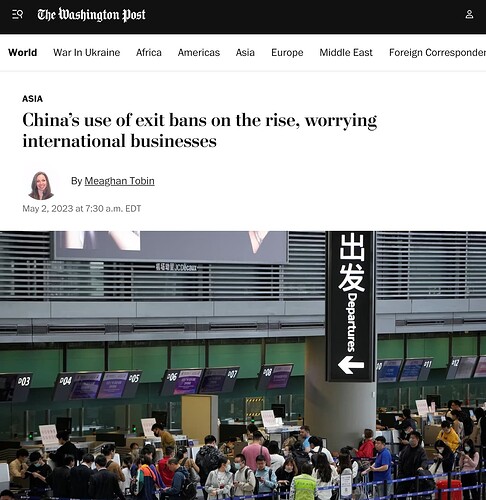-
根据保障人权组织的一份报告,自2012年以来,中国政府大幅增加了对出境禁令的使用。
-
出境禁令用于压制活动人士,恐吓外国记者,控制民族和宗教团体,并迫使人们返回中国接受调查。
-
自2018年以来,北京增加了有关出境禁令的法律数量,使法律状况更加复杂和混乱。
-
关于出境禁令的确切统计数据不详,但 "保障维权 "组织发现,一些指标显示出境禁令的使用在增加。
-
最高人民法院的官方数据库显示,2016年至2020年期间,提及出境禁令的次数增加了8倍。
-
中国公安部没有回应关于有多少人被禁止出境的问题。
-
自2012年以来,中国政府出于政治原因增加了对出境禁令的使用。
-
自2018年以来,关于出境禁令的法律和法规已经颁布或修订,使法律状况更加复杂和混乱。
-
各项指标显示出境禁令的数量有所增加,但没有确切的统计数据。
-
最近几周,在中国经营的外国企业有越来越多的理由感到担忧。当局突击检查了美国尽职调查公司Mintz的北京办事处,并拘留了五名当地工作人员,审查了美国芯片制造商美光科技的进口产品,拘留了日本制药商安斯泰来制药的一名雇员,并询问了咨询公司贝恩公司在上海的工作人员。政府还鼓励国有企业停止与四大国际会计师事务所合作,一些外国用户被切断了与中国关键的知识和数据来源的联系。
-
上月底对中国反间谍法进行了全面修订,对被认为与国家安全有关的材料撒下了一张大网,而且没有对国家安全利益进行定义。这项法律允许对被调查的任何人实施出境禁令。美国商会说,修订后的间谍法有可能动摇投资者的信心,分析家和观察家们表示担心,以前普通的研究活动现在可能属于该法的模糊保护范围。
-
搜查和拘留加剧了高管和投资者对继续在该国经营的风险的不安。日本政府警告其国民要提高警惕,不要违反法律,日本媒体报道说,自2014年以来,至少有17名日本国民因涉嫌从事间谍活动而在中国被拘留。中国外交部发言人毛宁说,中国政府致力于培养一个世界级的商业环境,但所有公司都必须依法经营。
-
Chinese government has significantly increased the use of exit bans since 2012, according to a report by Safeguard Defenders.
-
Exit bans used to silence activists, intimidate foreign journalists, control ethnic and religious groups, and pressure people to return to China to face investigation.
-
Beijing has added to the number of laws regarding exit bans since 2018, making the legal landscape more complex and confusing.
-
Exact statistics on exit bans are not available, but Safeguard Defenders found a number of indicators showing an increase in their use.
-
Supreme People’s Court’s official database showed an eightfold increase in the number of mentions of exit bans between 2016 and 2020.
-
China’s Ministry of Public Security did not respond to questions about how many individuals are subject to exit bans.
-
Chinese government has increased the use of exit bans for political reasons since 2012.
-
Laws and regulations on exit bans have been enacted or amended since 2018, making the legal landscape more complex and confusing.
-
Indicators show an increase in the number of exit bans, but exact statistics are not available.
-
In recent weeks, foreign businesses operating in China have had growing cause for concern. Authorities have raided the Beijing office of U.S. due diligence company Mintz and detained five local staff members, put imports from American chip maker Micron Technology under review, detained an employee of Japanese drugmaker Astellas Pharma and questioned staff at consulting firm Bain & Co. in Shanghai. Beijing has also encouraged state-owned firms to stop working with the big four international accounting firms and some foreign subscribers have been cut off from critical Chinese sources of knowledge and data.
-
A sweeping overhaul of China’s counter espionage law late last month casts a wide net over materials considered relevant to national security, and does not define national security interests. This law allows for an exit ban to be imposed on anyone under investigation. The U.S. Chamber of Commerce said that the revised spy law risks shaking investor confidence and analysts and observers have expressed concern that previously ordinary research activities could now fall under the law’s vague umbrella.
-
The raids and detentions have heightened unease among executives and investors about the risks of continuing to operate in the country. The Japanese government warned its nationals to be on alert not to violate the law, and Japanese media reported that since 2014, at least 17 Japanese nationals had been detained in China for alleged spying. China’s Foreign Ministry spokeswoman Mao Ning said Beijing was committed to fostering a world-class business environment, but that all companies must operate in accordance with the law.
https://www.washingtonpost.com/world/2023/05/02/china-exit-bans-foreigners-business/
